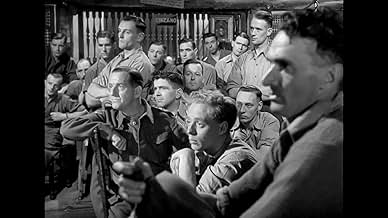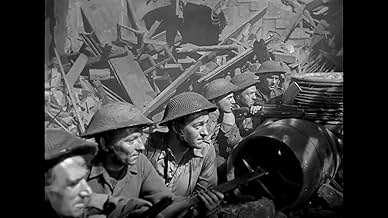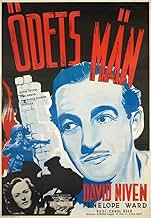VALUTAZIONE IMDb
6,9/10
2380
LA TUA VALUTAZIONE
Aggiungi una trama nella tua linguaWorld War II drama that follows a group of British draftees, starting with their rigorous basic training, and ending with their deployment in North Africa.World War II drama that follows a group of British draftees, starting with their rigorous basic training, and ending with their deployment in North Africa.World War II drama that follows a group of British draftees, starting with their rigorous basic training, and ending with their deployment in North Africa.
- Regia
- Sceneggiatura
- Star
- Premi
- 1 vittoria in totale
Hugh Burden
- Pte. Bill Parsons
- (as Hugh Burdon)
Jimmy Hanley
- Pte. Geoffrey Stainer
- (as Jimmie Hanley)
William Hartnell
- Sgt. Ned Fletcher
- (as Billy Hartnell)
A. Bromley Davenport
- Chelsea Pensioner
- (as Bromley Davenport)
Renée Asherson
- Marjorie Gillingham
- (as Renee Ascherson)
Recensioni in evidenza
A film that despite being made in 1944, avoids sterotyping British Characters. A story about a group of people, from various civilian jobs, who receive their call-up papers. It shows them progressing through their training and entering action in North Africa.
It's long but it's good. For a British film from 1944 the production values are amazingly high. Whole buildings -- real ones -- collapse. The special effects at sea are convincing. And what a cast!
Actually, the story itself is hardly new. A diverse group of men are drafted into the Duke of Glendons, go through a training camp periods, their transport is torpedoed, and they fight a small-scale defensive battle among the ruins of a village in North Africa. Writers Eric Ambler and Peter Ustinov have whipped it into entertaining shape.
None of the men is regular army except the tough sergeant who has eyes like a lizard but the heart of a Rogerian therapist. David Niven has risen from the ranks and is a lieutenant. The men themselves, with their winsome misapprehensions, are brought into a state of readiness by a combination of strict physical demands and compassion. The leaders are stern but fair. I won't bother describing the draftees because you can already guess their nature from a dozen other war movies -- the grumbler, the show-off, the snob, the Welshman, the earnest patriot.
If you didn't know that it was directed by Carol Reed, you'd still probably notice some unusual directorial touches. A sleepy backwater little town. An old man, half asleep, brushing the flies from his face. A dog sleeping in the street. And then the distant sound of motorcycles and bren carriers growing louder. And soon a stream of British vehicles lumbering loudly through the main street and stirring the dust, with the dog lazily moping away and a disheveled Peter Ustinov emerging from the Cafe Rispoli to stare sullenly at the pageant.
It may or may not sound promising in a synopsis but in fact it's pretty good.
Actually, the story itself is hardly new. A diverse group of men are drafted into the Duke of Glendons, go through a training camp periods, their transport is torpedoed, and they fight a small-scale defensive battle among the ruins of a village in North Africa. Writers Eric Ambler and Peter Ustinov have whipped it into entertaining shape.
None of the men is regular army except the tough sergeant who has eyes like a lizard but the heart of a Rogerian therapist. David Niven has risen from the ranks and is a lieutenant. The men themselves, with their winsome misapprehensions, are brought into a state of readiness by a combination of strict physical demands and compassion. The leaders are stern but fair. I won't bother describing the draftees because you can already guess their nature from a dozen other war movies -- the grumbler, the show-off, the snob, the Welshman, the earnest patriot.
If you didn't know that it was directed by Carol Reed, you'd still probably notice some unusual directorial touches. A sleepy backwater little town. An old man, half asleep, brushing the flies from his face. A dog sleeping in the street. And then the distant sound of motorcycles and bren carriers growing louder. And soon a stream of British vehicles lumbering loudly through the main street and stirring the dust, with the dog lazily moping away and a disheveled Peter Ustinov emerging from the Cafe Rispoli to stare sullenly at the pageant.
It may or may not sound promising in a synopsis but in fact it's pretty good.
Although it may appear simplistic to divide the work of great artists into three distinct periods, there can be no escaping the fact that this tidy and convenient way of classification actually works for the majority. In the case of the most significant British director of the immediate post World War II years, Carol Reed, the chronological view works surprisingly well. There is the fairly anonymous early period up to "The Way Ahead" of 1944, a glorious middle period from "Odd Man Out" to "Outcast of the Islands" - the subsequent "The Man Between" and "A Kid for Two Farthings", although less successful, belong to this period because of their stylistic affinity - and a third period where Reed reverted to anonymity possibly through the pressures of commercialism - how else to explain works as dull as "The Agony and the Ecstasy" and "The Running Man", which do not even look like Reed films. Certainly none of the other films in the first period compare with the sheer enjoyment and confidence of "The Way Ahead". Here the youngish director flexes his muscles, a little parochially perhaps, before taking centre stage with the great directors of that time, De Sica, Rossellini, Welles and Wyler. Technically the film is astonishingly assured. Every shot is lovingly composed with figures always formally balanced within each frame. The editing is nothing short of brilliant. It is only in retrospect and with the advantage of several showings that one realises that the excitement and immediacy of a scene such as the torpedoing of the troopship are entirely achieved by the skill of montage. In every sense "The Way Ahead" is immeasurably superior to the Lean/Coward naval counterpart "In Which We Serve" which parades class distinctions in a way that is positively nauseous. There is nothing patronising in Reed's presentation of a group of men drawn together by the accident of war. Although they come from different social backgrounds, Reed presents them as conditioned by their varied forms of employment rather than being pigeonholed by class. "The Way Ahead" is that very unusual thing, a completely upbeat war film. I suppose it had to be, given its date - 1944. With the scent of victory about to be achieved it had to be an optimistic morale booster. However it goes very much further than any other I know in presenting a completely sanitised war. Not a single character is killed let alone wounded - and this even after the ship carrying the bulk of the cast is blown to smithereens just seconds after the captain leaves. The film ends with the men attaching bayonets to rifles before marching forward into a desert attack. By now we are conditioned into thinking they will all survive although we will never have a way of really knowing. Not that it matters at this stage. So sit back, relax and enjoy as lovely a war as you are ever likely to experience.
10mowens1
Having lived in England at the time this movie depicts, I can attest to the absolute authenticity of its content. The characters were those I met every day during those awful years of turmoil. I am also advised by my husband, an ex-paratrooper, that this movie was used as a training film for all recruits, because of its strict adherence to actual army conditions in those days. The main joy for me in watching this film is the group of actors who were so familiar to all of us during those years. From Stanley Holloway (later so famous as Eliza Doolittle's father) to Jimmy Hanley, the handsome, easy-going boy-next door, and all the others in that wonderful ensemble cast - they all appeared in many different movies and were always welcomed as old friends whenever we saw them on the screen.
(Minor Spoilers) One of the very best war movies to be made while WWII was still in progress with almost no hint of propaganda and false or movie-like heroism on the part of the good guys a squad,not battalion, of British Tommies in the North African desert. Released in London on June 6, 1944 D-Day, the film was released in the USA a year later as "The Immortal Battalion, "The Way Ahead" couldn't have come at a better time with the Allies and Nazis in a life and death struggle on the beaches of Normandy.
The movie starts off with a number of British recruits well into their 20's or even early 30's getting the hang of military life which at first they greatly, like their first sergeant Ned Fletcher(William Hertwell), dislike. As the trooper are whipped into shape by the though as nails Sgt. Fletcher and their commanding officer the soft spoken Let. Jim Perry, Davd Niven, their slated to sail to French North Africa to participate in the invasion, in Operation Torch, of Vichy France's colonies Algeria and Tunisia. As things turn out the troop ship that their in gets struck by a German U-boat torpedo and sinks, with half the battalion lost, in the Mediterranean Sea.
With Let.Perry's unite now reduced to company size it's sent to Gibraltar for what seems like the remainder of the war. It's not until the battle of El Alamein starts to turn against the British Eight Army that Let. Perry's men are immediately sent to the front lines to stop the German Afrika's Corps advance. We , as well as Perry's men, finally get to see action as Let. Perry's men are outflanked and cut off by the advancing German troops as the battle of El Alamein rages on behind their backs.
Fghting for their very lives and almost out of ammunition the trapped and outnumbered British troops at the end of the movie tack on their bayonets and walk out of the safety of their barricaded and fixed position, the Rispoli Café, to confront the heavily armed Germans. And at the same time walk into the pages of history in both courage and valor under fire.
You just can't keep from holding back your tears in watching the movie knowing that almost all the cast will eventually end up killed or captured. The movie both didn't overemphasize the British Troops as well as downplay Rommell's Africa Corps. Both parties came across equally brave and effective in the fighting that takes pace in the film. Which is very rare in war movies were one side, the one who makes the film, is shown vastly superior morally as well as militarily over the other: The one that the side who made the movie is at war with.
P.S Look for both Actor Peter Ustinov as café owner Rispoli and Trevor Howard as the troop ships, that goes under the waves, officer in the movie.
The movie starts off with a number of British recruits well into their 20's or even early 30's getting the hang of military life which at first they greatly, like their first sergeant Ned Fletcher(William Hertwell), dislike. As the trooper are whipped into shape by the though as nails Sgt. Fletcher and their commanding officer the soft spoken Let. Jim Perry, Davd Niven, their slated to sail to French North Africa to participate in the invasion, in Operation Torch, of Vichy France's colonies Algeria and Tunisia. As things turn out the troop ship that their in gets struck by a German U-boat torpedo and sinks, with half the battalion lost, in the Mediterranean Sea.
With Let.Perry's unite now reduced to company size it's sent to Gibraltar for what seems like the remainder of the war. It's not until the battle of El Alamein starts to turn against the British Eight Army that Let. Perry's men are immediately sent to the front lines to stop the German Afrika's Corps advance. We , as well as Perry's men, finally get to see action as Let. Perry's men are outflanked and cut off by the advancing German troops as the battle of El Alamein rages on behind their backs.
Fghting for their very lives and almost out of ammunition the trapped and outnumbered British troops at the end of the movie tack on their bayonets and walk out of the safety of their barricaded and fixed position, the Rispoli Café, to confront the heavily armed Germans. And at the same time walk into the pages of history in both courage and valor under fire.
You just can't keep from holding back your tears in watching the movie knowing that almost all the cast will eventually end up killed or captured. The movie both didn't overemphasize the British Troops as well as downplay Rommell's Africa Corps. Both parties came across equally brave and effective in the fighting that takes pace in the film. Which is very rare in war movies were one side, the one who makes the film, is shown vastly superior morally as well as militarily over the other: The one that the side who made the movie is at war with.
P.S Look for both Actor Peter Ustinov as café owner Rispoli and Trevor Howard as the troop ships, that goes under the waves, officer in the movie.
Lo sapevi?
- QuizIn the U.K., this was released on D-Day, June 6, 1944.
- BlooperFollowing some energetic army training, Private Bill Parsons is seen sitting on the grass at the top of a cliff, with his colleagues, exhausted. However, the action then cuts to him being helped up the cliff.
- Citazioni
Pvt. Ted Brewer: Only one good man ever got into Parliament.
Pvt. Herbert Davenport: Oh really? Who?
Pvt. Ted Brewer: Bleedin' Guy Fawkes.
- Curiosità sui creditiThe film ends with THE BEGINNING
- Versioni alternativeThe version seen on American TV under the alternate title "The Immortal Battalion" has been re-edited and extensively cut (from 115 to 91 or 86 minutes) by Ed Fitz with an added preface and epilogue by war correspondent Quentin Reynolds.
- ConnessioniEdited into WW II Theater: The Way Ahead (2022)
- Colonne sonoreIf You Were the Only Girl (in the World)
(uncredited)
Written by Nat Ayer
Lyrics by Clifford Grey
Performed by Tessie O'Shea and soldiers
I più visti
Accedi per valutare e creare un elenco di titoli salvati per ottenere consigli personalizzati
- How long is The Way Ahead?Powered by Alexa
Dettagli
- Tempo di esecuzione
- 1h 55min(115 min)
- Colore
- Proporzioni
- 1.37 : 1
Contribuisci a questa pagina
Suggerisci una modifica o aggiungi i contenuti mancanti



































